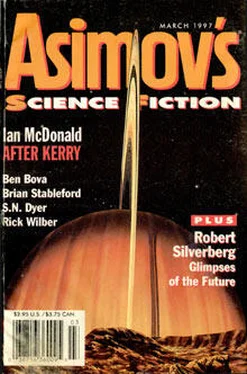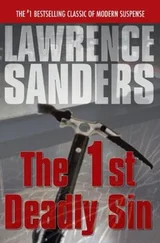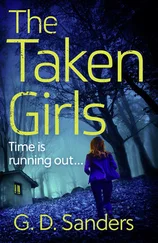William Sanders - The Undiscovered
Здесь есть возможность читать онлайн «William Sanders - The Undiscovered» весь текст электронной книги совершенно бесплатно (целиком полную версию без сокращений). В некоторых случаях можно слушать аудио, скачать через торрент в формате fb2 и присутствует краткое содержание. Год выпуска: 1997, Издательство: Dell Magazines, Жанр: Фантастика и фэнтези, на английском языке. Описание произведения, (предисловие) а так же отзывы посетителей доступны на портале библиотеки ЛибКат.
- Название:The Undiscovered
- Автор:
- Издательство:Dell Magazines
- Жанр:
- Год:1997
- ISBN:нет данных
- Рейтинг книги:3 / 5. Голосов: 1
-
Избранное:Добавить в избранное
- Отзывы:
-
Ваша оценка:
- 60
- 1
- 2
- 3
- 4
- 5
The Undiscovered: краткое содержание, описание и аннотация
Предлагаем к чтению аннотацию, описание, краткое содержание или предисловие (зависит от того, что написал сам автор книги «The Undiscovered»). Если вы не нашли необходимую информацию о книге — напишите в комментариях, мы постараемся отыскать её.
and
and for his short stories based on Cherokee tradition. (Two of these stories have appeared in the twelfth and thirteenth editions of the Year’s Best Science Fiction.) In his first tale for
Mr. Sanders works both veins at once…
The Undiscovered — читать онлайн бесплатно полную книгу (весь текст) целиком
Ниже представлен текст книги, разбитый по страницам. Система сохранения места последней прочитанной страницы, позволяет с удобством читать онлайн бесплатно книгу «The Undiscovered», без необходимости каждый раз заново искать на чём Вы остановились. Поставьте закладку, и сможете в любой момент перейти на страницу, на которой закончили чтение.
Интервал:
Закладка:
Then it was time to begin.
What? Oh, no, I was not an akta. By now I knew the words to the whole plei, from having translated and repeated them so many times. So I stood behind a reed screen and called out the words, in a voice too low for the crowd to hear, when anyone forgot what came next.
Spearshaker, yes. He was the ghost. He had put some paint on his face that made it even whiter, and he did something with his voice that made the hair stand up on your neck.
But in fact everyone did very well, much better than I had expected. The only bad moment came when Amaledi—that was Tsigeyu’s son Hummingbird—shouted, “Na! Dili, dili!” —“There! A skunk, a skunk!”—and slammed his war club into the wall of the “chief’s house,” forgetting it was really just a reed mat. And Beartrack, who was being Quolonisi, took such a blow to the head that he was out for the rest of the plei. But it didn’t matter, since he had no more words to speak, and he made a very good dead man for Amaledi to drag out.
And the people loved it, all of it. How they laughed and laughed! I never heard so many laugh so hard for so long. At the end, when Amaledi fell dead between his mother and Panther and the platform was covered with corpses, there was so much howling and hooting you would have taken it for a hurricane. I looked out through the mats and saw Tsigeyu and Bigkiller holding on to each other to keep from falling off the bench. Warriors were wiping tears from their eyes and women were clutching themselves between the legs and old Dotsuya was lying on the ground kicking her feet like a baby.
I turned to Spearshaker, who was standing beside me. “See,” I said. “And you were afraid they wouldn’t understand it!”
After that everything got confused for a while. Locust and Blackfox rushed up and dragged Spearshaker away, and the next time I saw him he was down in front of the platform with Tsigeyu embracing him and Bigkiller slapping him on the back. I couldn’t see his face, which was hidden by Tsigeyu’s very large front.
By then people were making a fuss over all of us. Even me. A Paint Clan woman, not bad-looking for her age, took me away for some attention. She was limber and had a lot of energy, so it was late by the time I finally got home.
Spearshaker was there, sitting by the fire. He didn’t look up when I came in. His face was so pale I thought at first he was still wearing his ghost paint.
I said, “Gusdi nusdi? Is something wrong?”
“They laughed,” he said. He didn’t sound happy about it.
“They laughed,” I agreed. “They laughed as they have never laughed before, every one of them. Except for Otter, and no one has ever seen him laugh.”
I sat down beside him. “You did something fine tonight, Spearshaker. You made the People happy. They have a hard life, and you made them laugh.”
He made a snorting sound. ‘Yes. They laughed to see us making fools of ourselves. Perhaps that is good.”
“No, no.” I saw it now. “Is that what you think? That they laughed because we did the plei so badly?”
I put my hand on his shoulder and turned him to face me. “My friend, no one there tonight ever saw a plei before, except for you. How would they know if it was bad? It was certainly the best plei they ever saw.”
He blinked slowly, like a turtle. I saw his eyes were red.
“Believe me, Spearshaker,” I told him, “they were laughing because it was such a funny story. And that was your doing.”
His expression was very strange indeed. “They thought it comical?”
“Well, who wouldn’t? All those crazy people up there, killing each other—and themselves—and then that part at the end, where everyone gets killed!” I had to stop and laugh, myself, remembering. “I tell you,” I said when I had my breath back, “even though I knew the whole thing by memory, I nearly lost control of myself a few times there.”
I got up. “Come, Spearshaker. You need to go to sleep. You have been working too hard.”
But he only put his head down in his hands and made some odd sounds in his throat, and muttered some words I did not know. And so I left him there and went to bed.
If I live until the mountains fall, I will never understand white men.
If I liue vntil our Saviour’s returne, I shall neuer vnderstande Indians. Warre they count as Sport, and bloody Murther an occasion of Merriment: ’tis because they hold Life itselfe but lightly, and think Death no greate matter neyther: and so that which we call Tragick, they take for Comedie. And though I be damned for’t, I cannot sweare that they haue not the Right of it.
Whatever happened that night, it changed something in Spearshaker. He lived with us for many more years, but never again did he make a plei for us.
That was sad, for we had all enjoyed the Amaledi story so much, and were hoping for more. And many people tried to get Spearshaker to change his mind—Tsigeyu actually begged him; I think it was the only time in her life she ever begged anyone for anything—but it did no good. He would not even talk about it.
And at last we realized that his medicine had gone, and we left him in peace. It is a terrible thing for a didahnvwisgi when his power leaves him. Perhaps his ancestors’ spirits were somehow offended by our plei. I hope not, since it was my idea.
That summer Ninekiller’s daughter Cricket became Spearshaker’s wife. I gave them my house, and moved in with the Paint Clan woman. I visited my friend often, and we talked of many things, but of one thing we never spoke.
Cricket told me he still made his talking marks, from time to time. If he ever tried to make another plei, though, he never told anyone.
I believe it was five winters ago—it was not more—when Cricket came in one day and found him dead. It was a strange thing, for he had not been sick, and was still a fairly young man. As far as anyone knew there was nothing wrong with him, except that his hair had fallen out.
I think his spirit simply decided to go back to his native land.
Cricket grieved for a long time. She still has not taken another husband. Did you happen to see a small boy with pale skin and brown hair, as you came through our town? That is their son Wili.
Look what Cricket gave me. This is the turkey feather that was in Spearshaker’s hand when she found him that day. And this is the piece of mulberry bark that was lying beside him. I will always wonder what it says.
We are such stuff as Dreames are made on: and our little Life Is rounded in a sle
1. Elizabethan spelling was fabulously irregular; the same person might spell the same word in various ways on a single page. Shakespeare’s own spelling is known only from the Quarto and Folio printings of the plays, and the published poetry; and no one knows how far this may have been altered by the printer. It is not even known how close the published texts are to Shakespeare’s original in wording, let alone spelling. All we have in his own hand is his signature, and this indicates that he spelled his own name differently almost every time he wrote it.
I have followed the spelling of the Folio for the most part, but felt free to use my own judgment and even whim, since that was what the original speller did.
I have, however, regularized spelling and punctuation to some extent, and modernized spelling and usage in some instances, so that the text would be readable. I assume this magazine’s readership is well-educated, but it seems unrealistic to expect them to be Elizabethan scholars.
2. Cherokee pronunciation is difficult to render in Roman letters. Even our own syllabary system of writing, invented in the nineteenth century by Sequoyah, does not entirely succeed, as there is no way to indicate the tones and glottal stops. I have followed, more or less, the standard system of transliteration, in which “v” is used for the nasal grunting vowel that has no English equivalent.
Читать дальшеИнтервал:
Закладка:
Похожие книги на «The Undiscovered»
Представляем Вашему вниманию похожие книги на «The Undiscovered» списком для выбора. Мы отобрали схожую по названию и смыслу литературу в надежде предоставить читателям больше вариантов отыскать новые, интересные, ещё непрочитанные произведения.
Обсуждение, отзывы о книге «The Undiscovered» и просто собственные мнения читателей. Оставьте ваши комментарии, напишите, что Вы думаете о произведении, его смысле или главных героях. Укажите что конкретно понравилось, а что нет, и почему Вы так считаете.












